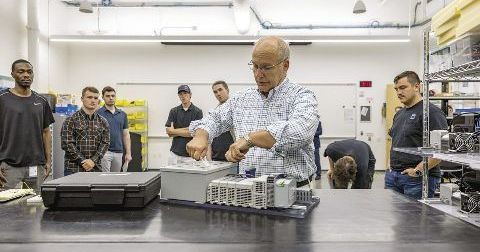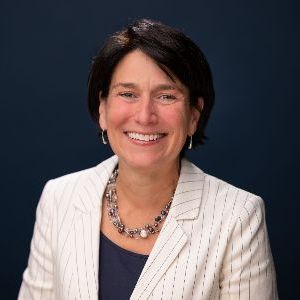
Central CT State Univ. Pilots Robotics Apprenticeship with TRUMPF As Model for Systemwide ‘Preferred Employer Program’
September 10, 2025
Central Connecticut State University has launched a new robotics and mechatronics technician apprenticeship program in partnership with high-tech manufacturer TRUMPF Inc.
It’s the first in a series of pilots that the Connecticut State Colleges and Universities (CSCU) system is calling a “preferred employer program,” which offers custom-tailored training and a tuition discount to local businesses.
In this first iteration, over the course of four semesters, nine apprentices employed by TRUMPF will take courses in an undergraduate certificate program in robotics and mechatronics designed by faculty at Central’s School of Engineering, Science & Technology.
The classes are offered in the evening because all the apprentices work a full 40-hour week with TRUMPF, which manufactures industrial lasers and metal fabrication equipment. The course materials were taken from the engineering school’s current offerings, but adapted for the needs of the company.
“This partnership with TRUMPF exemplifies our commitment at Central to aligning our educational offerings directly with the evolving needs of industry,” said Central President Zulma R. Toro. “We understand the critical demand for highly skilled professionals in advanced manufacturing, and this program is a direct response to that need.”
The company pays the tuition and fees for the apprentices, and gets a 5% tuition discount as part of the program. The full 12-credit course will cost the company $7,000 per apprentice. A student enrolling outside of an employer-sponsored program would pay $7,704 for the same number of credits, although Central officials say a direct comparison doesn’t reflect all of the variables.
It’s not a totally new concept. Central has in the past had a similar arrangement with the former United Technologies Corp. (now Raytheon Technologies). And in June, the state colleges system greenlit tuition discounts for the CT Community Nonprofit Alliance and AFSCME Local 714.
Now CSCU administrators are looking to formalize and scale the program across its institutions, which include four state universities (Central, Eastern, Southern and Western), Charter Oak State College and CT State Community College.
Filling skill gaps
TRUMPF has its North American headquarters in Farmington, where it recently added a 55,000-square-foot “smart” factory facility.
The company has a longstanding two-year, 4,000-hour apprenticeship program registered through the state Department of Labor. TRUMPF once partnered with Tunxis Community College for training, but after that school’s advanced manufacturing program was discontinued, the company began exploring alternatives.
About a year ago, company officials approached Central to discuss a collaboration.
“They have the specialized equipment needed to teach future technicians the tasks that we were looking for, which includes problem-solving and strategic-thinking skills, in order for them to become successful at TRUMPF, or any other advanced manufacturing companies,” said Jinnette Perez-Orr, the head of field service engineer training and the apprentice program at TRUMPF.
The company has its own training center and undertakes a lot of the apprentices’ education. But Perez-Orr says they partner with Central for specific higher-level skills.
“Manufacturing jobs have changed significantly in the last decade, and we really want to focus on the next generation of our workforce,” she said. “Many manufacturing operations are often highly automated, and these environments really require employees with skills in data analytics who can interpret real-time sensor data, programming and integration skills.”
The first course in the certificate program for TRUMPF is being taught by Brian Romano, an adjunct instructor who is also on the industrial advisory committee at the university. His day job is as director of technology development at Bristol-based Arthur G. Russell Co., which designs and builds custom automation systems that help manufacturers assemble products faster and more efficiently.
“There’s a huge workforce shortage and skills gap that’s going on,” Romano said. “I’m looking for two engineers right now at my place of work, and it is extremely difficult to find them. There are not many institutions that have a curriculum like Central, but it is something that’s desperately needed.”
Romano said he tailors classroom engineering material to match apprentices’ day-to-day work.
“You’ve got several good instructors that are tenured faculty as well as technologists that are people that are actually applying this stuff in the real world, teaching this subject matter,” he said.
Entrepreneurial mindset
Carolyn Freer, Central’s enrollment management specialist for external partnerships, said the preferred employer program with TRUMPF underscores higher education’s evolving role and the value of industry partnerships.
The same program deal, she said, has been offered to Naugatuck-based Ion Bank and to the members of three nearby chambers of commerce.
“Part of my job is to identify partners within the industry that are looking for specific training, and would like to send their employees to us for that training,” Freer said. “So, it takes the burden off of the employer, especially if they’re a smaller employer.”
Future expansion of the preferred employer program is in the cards, if funding allows. The topic was discussed during the CSCU’s Board of Regents meeting in late August. The cash-strapped system is forecasting a sizable deficit in this fiscal year, prompting questions about the tuition reduction being extended widely to employers.
“What is the quid pro quo here?” said Regent Ira Bloom. “We are giving partial tuition waivers. What’s the other side of this agreement? It seems to me that a lot more additional information is needed here before we agree to a tuition reduction.”
Toro, the Central president, told Bloom it’s an efficient way to increase the number of students at the campus without adding significantly to overhead. She urged the board to adopt an entrepreneurial mindset.
“We are being forced to look at higher education as a business because we are not getting the funding from the state,” she said. “This is a way to incentivize enrollment.”
Connecticut State Colleges and Universities Interim Chancellor John Maduko has promised a working group to monitor how the preferred employer program plays out over the year-long pilots, but he’s excited about the prospect of scaling the program, particularly through chambers of commerce.
“It speaks to adult learners. It speaks to individuals that maybe will have never enrolled or thought about college,” he told the Hartford Business Journal. “The cost of recruiting drops because the chamber will be doing the outreach on behalf of Central. And then Central will capture students that otherwise would have never enrolled. So, that is a net positive from a revenue standpoint.”
And, he says Central’s involvement with employer partnerships could provide a proof of concept for the whole state college system.
He said other state colleges “are in active conversations with their respective employer and industry partners in terms of innovative ways to address workforce development needs, but also identify a new population of potential students that require an alternative route of engagement.”
Read the original article here.









